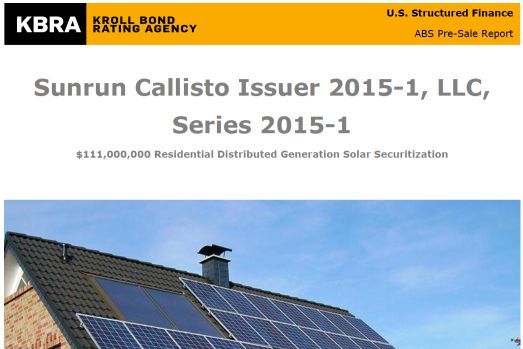It's a busy time for solar financier and installer Sunrun. The company just revealed its IPO registration document this week and it's issuing an offer for asset-backed securities as well. It's the fourth securitization of pooled residential solar rooftops and the first by a company that isn't SolarCity.
Sunrun is offering an aggregate of $100 million in pooled residential rooftops, more than the $54.4 million that SolarCity offered in its maiden securitization back in November 2013. At that time, Shayle Kann, GTM Research's senior VP, saw it as potentially "a bigger deal than a solar REIT or MLP." He also said it is "no surprise that SolarCity is the first; expect to see Sunrun and others take a shot."
So, here's Sunrun taking a shot with $100 million and a preliminary 'A' rating from the Kroll Bond Rating Agency. SolarCity's first ABS had a 'BBB+' rating from Standard & Poor’s.
Updating this story: Sunrun's Class A Notes -- $100,000,000 in aggregate principal amount -- will bear interest at a rate of 4.40 percent per annum with an anticipated repayment date of July 22, 2024. Compare this to the interest on SolarCity's BBB+ rated 2013-1 notes at 4.80 percent. A banker colleague noted at the time, "It's not a bad rate. A little under where a swapped bank deal would end up." SolarCity's more recent offer, 2014-1, came with a slightly better rate of 4.6 percent.
And Sunrun's 4.4 percent rate shows a market getting increasingly comfortable with securitized solar.
Vital stats of Callisto, Sunrun's asset-backed security
-
Number of PV systems: 7,893
-
System size: 7.15 kilowatts weighted average
-
Weighted average PPA price: $0.20 per kilowatt-hour with an average escalator of 1.76 percent. SolarCity's first offering had a weighted average PPA price of $0.15 per kilowatt-hour with a 2.07 percent escalator.
-
FICO score weighted average: 759 (SolarCity's was about the same at 762.)
-
Range of customer agreement initial terms: 216 to 240 months
-
Approximately 50 percent of Sunrun's installations were completed in the last two years.
-
47 EPC partners have been employed to sell and install the PV systems in this pool. EPC partners Verengo, PetersenDean, and Roof Diagnostics are no longer financing new PV systems via Sunrun’s platform. Verengo moved to CPF, PetersenDean only provides loans or cash sales and Roof Diagnostics was acquired by NRG. Verengo, Sungevity and Sunrun (formerly REC Solar) combine for 65 percent of the installed rooftops.
-
"The over-collateralization is a really interesting factor as well," said MJ Shiao, director of solar research at GTM. "Basically, how many extra assets do SolarCity and Sunrun have to pack into the offering to ensure a good rating? SolarCity's first ABS had 61 percent over-collateralization. By LMC III, that was 37 percent. In Sunrun's offer, tranche A has 37 percent and tranche B has 24 percent. That speaks quite a bit about the perception of default risk, too."
-
Sunrun's portfolio uses monitoring systems from Itron, Locus and Enphase.
-
California residents represent approximately 71 percent of the customer mix in this offering. The top three states (California, New Jersey, New York) account for approximately 86 percent. SolarCity's mix was dominated by California, Arizona and Colorado.
Distributed solar has reached the scale where it can access larger pools of once-unavailable, lower-cost capital. It's another piece of the equation where solar is cutting cost and going mainstream.
SolarCity's first offering of securitized solar had an interest rate of 4.80 percent -- but these are different times.
Power Finance and Risk reports that SunPower is also "planning its first residential solar asset-backed securities deal, which is slated to be launched in the first quarter of 2016." The deal is expected to be in the range of $50 million to $125 million in residential PV installations. PFR notes, "The step-down of the Investment Tax Credit, a lack of PPAs, and the need for a lower cost of capital are expected to drive a significant growth in the nascent solar ABS market over the next few years. Sponsors cite the hesitancy of rating agencies to rate leased or loaned solar assets as a barrier to entry."




